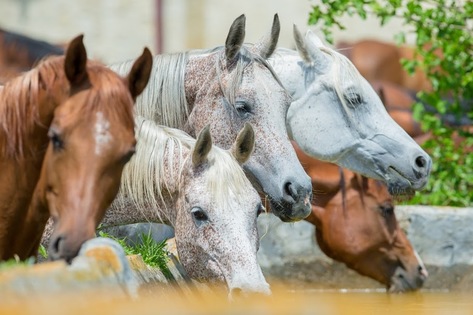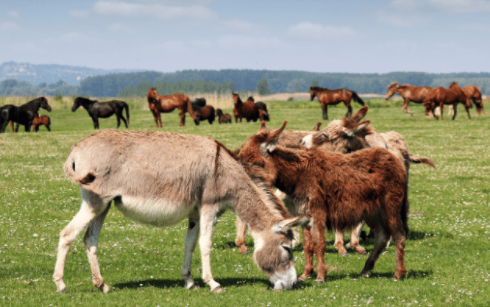
The Most Popular Horse Breeds Of 2019
Equestrian Advice & Guides General Equestrian
Build your business profile for FREE and expose your services to thousands of potential clients!
Create my profile now!
Horses and donkeys look quite similar in terms of body shape and many other qualities, but there are some key differences between them. Such similarities are quite helpful for them to adjust if kept along side each other.
Despite their list of differences, these two can make quite good friends. This bond results from the key similarities of donkeys and horses due to their great companionship.
Donkeys and horses have quite opposite personalities but it can work as an advantage in many ways. Horses and donkeys living together is not uncommon.
Horses, donkeys, and ponies have similarities in their conformation and habits and that helps a lot to build their strong companionship. They can live and easily adjust together.
It doesn't mean that all the donkeys can live with horses, but there is a possibility that they will form close bonds with one another. Being social animals, donkeys and horses often build up bonds and become companions.
Similarly, the racehorses and show horses also become companions with miniature donkeys and enjoy their company while living in their stalls. It is observed that when racehorses come alongside the tracks for traveling, their friends' donkeys also come with them to keep them company.
Donkey's companionship helps to relieve the stress of the newly introduced, high energetic horses and helps them to keep calm.
Donkeys also become great mates with horses in pastures.
Donkeys have an unappreciated characteristic of their stoicism. They have more sense to conceal the fear and pain. It can be observed in the tune of the donkey’s braying.
Donkeys can be great companions to horses and are capable of forming strong bonds with each other. Donkeys are habitually loving and sweet and they become easy keepers when they gain your trust.
Horses and donkeys are social animals so it is quite easy for them to become companions.
But there are many differences between them both that might not help to keep them together for long periods of time.
Donkeys need regular care for maintaining health and body. Like horses, donkeys need regular dental and hoof care. Similarly, the worming schedule is also needed for donkeys for good health.
You need to keep an eye on body weight. They are prone to gaining weight and may need to follow a strict diet plan.
Donkeys don’t have waterproof coats so they will need shelter in the rain.
Being a social animal, donkeys do not live alone and prefer to live in pairs or with other animals like horses.
Most equestrians think that it is unsafe to keep horses and donkeys together due to the lungworms. Donkeys are more prone to lungworms and these worms are capable of spreading from donkeys to horses.
Commonly, the donkeys are tolerant of lungworm and rarely show the symptoms of parasite attack. But when these worms are transferred to horses, lungworms cause severe coughing and rapid breathing.
Thanks to scientific development for developing the testing mechanism of lungworms. As long as you follow the precautions, donkeys, and horses are safe to live together. But it is necessary to keep in mind that they are different species and different requirements.
Unlike the old times, scientific advancement now makes it possible to test lung worms through testing the feces of animals. Testing of donkeys will clarify the attack and help the owner to split the suspected animal.
“Claire Shand, director of marketing and communications at Westgate Laboratories, showed his full confidence to keep the ponies, horses, and donkeys together. But providing the alert for lungworms attack. Lungworm attack is relatively low, and cross-infection can occur while grazing in pastures together.”
Biosecurity regarding the re-homing of donkeys should be as rigorous as possible. A lot of companies offer fecal testing these days.
“Claire said, the best practice is to test the mules and donkeys before introducing them to the herd. The fecal sedimentation test conducted at a well reputable laboratory will clarify the lungworm attack.”
The fecal testing will check the animal’s parasite burden and help the owner to ensure the prevention of potential pasture contamination.
If any lungworm is suspected, the fecal sedimentation test can be used to confirm and split the suspect from the herd to avoid any spread.
“That’s why it is better to test the mules and donkeys for a host of infection, rather than the horses showing symptoms and more damage conditions.”
There are many sanctuaries and rescues that offer donkeys for adoption. Adopting a donkey from a sanctuary for your horse can be the better option as many sanctuaries have testing systems for lungworms before handing over the donkey and mules to others.
All you need to do is introduce them properly as the donkeys take a little more time to learn. When they become companions, you will often see them playing together.
It is still vital to take precautions and fulfill their unique demands as they have different personalities and diet plans.

